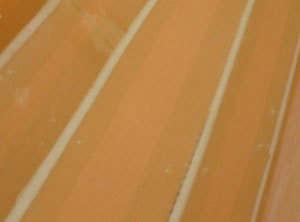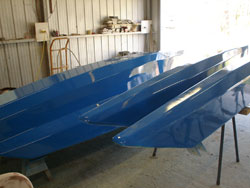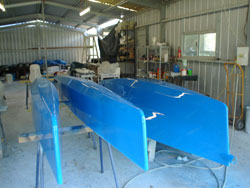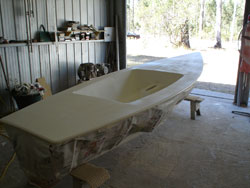
Team Scarab Multihulls
Older Blog entries |
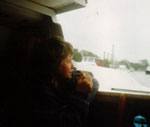 Fran Sneesby lives in S.E. Queensland building multihulls for Yendys Multihulls. |
Merry Christmas22 December 2010I was going to spend the next couple of weeks painting a Scarab 22. I waited too late to order the paint and everyone has gone on Christmas break. So we will sand and prepare the boat for paint. There has been so much rain here that it would not have been a good idea to paint anyway. There are several trees down on the road and the water will be over the roads in a few hours. Might just give up and enjoy the Christmas break. We have plenty of food and drink and we will enjoy our holiday in isolation. I hope you all have a Merry Christmas. | |
Tramps15 December 2010At last we have a day without rain. I have been waiting to paint 6 floats and a main hull for various little boats but no luck. This has been the wettest season on record so Iíve had to find other jobs. Finished making 4 tramp nets (2 for the 18 and two for the 350) using seatbelt webbing and they turned out very strong with little stretch.
|
|
Wet fillets.25 November 2010When making boats using flat panels, and for joining bulkheads in all boats, you have to use a fillet. After a couple of hours doing this you can get pretty quick. All the boats we build what seems like miles of fillets and it is a time consuming task. I have found that it is quicker and neater to use a wet fillet on inside panels when using tape to join panels together. Cut the glass tape and peel ply if desired. Apply a quick coat of resin along the joint and before it goes off mix the filleting compound (my favourite is resin mixed with aerosil and cotton fibres). The aerosil will retard the polyester resin and the cotton fibre gives it bulk. If using epoxy resin you should have enough time. Mix enough resin to apply the tape. Apply the filleting compound (a little sloppier than normal) along the joint with a filleting tool (the length of fillet will depend on how quick you are, temperature and type of resin). Lay the glass over the filleting compound, brush on the resin and compact the glass to remove the air bubbles (apply peel ply if you want). Apply more filleting compound and continue until the end of the joint. As you compact you can shape the fillet to give it a smooth shape and you have avoided any sanding that might have been necessary if you have waited until the fillet had hardened.
|
|
Moulding beams21 November 2010Most of the boats we build are made with laminated panels either plywood or foam. Building the moulds for the Scarab 12 has shown many ways we could improve our building technique. We usually make a mould to build the beams for the trimarans but they were hard to finish and have a tendency to shrink when built with polyester resin. When moulding we use gelcoat and a layer of thin CSM to prevent the bubbles that form in the resin to create pin holes in the finished beam. |
|
Scarab 35026 October 2010I took advantage of a couple of rain-free days and painted the bottom of the three hulls. Tomorrow will be devoted to finishing of the moulds for the Scarab 12 moulded boat.
|
|
Scarab 35027 September 2010The beams for the Scarab 350 are finished and ready for paint. The floats and all the other bits are ready for paint as well now all I have to do is wait for the rain to go away. Instead of using a dagger rudder on the Scarab 350 we will use a kick up rudder that was developed for the Scarab 12 made using a mould. |
|
Scarab 6503 September 2010 Life is a bit hectic now. While building moulds for the Scarab 12 we are also building two 12 footers as the moulds progress. The scarab 350 is being finished between jobs. Once these boats are finished I would love to have a project building one boat at a
time. |
|
Scarab 35017 August 2010 I started building a Scarab 350 using klegecell and polyester resin a while ago. It was shelved when we started the 2nd Scarab 18. As it was being built many people (usually parents who wanted a boat they could sail with their children) commented that this would be the perfect boat. Buoyed by the comments we started the project of the Scarab 12 (in the previous blog). The Scarab 350 is still here unfinished waiting for some tender loving care. All it needed was beams and a centreboard. Seeing the mould for the Scarab 12 centreboard was finished it was relatively quick to build the moulding of a centreboard. Then beams were the only thing left to do. They will be constructed using klegecell foam and polyester like the rest of the boat. |
|
Scarab 1210 August 2010 My family think that I am obsessed with boats and they may be right. Sometimes I think itís easier to stay in the shed laminating
and grinding than dealing with people and all the problems they seem to carry around with them. To keep my obsession satisfied
there must always be a project in the future (usually the more the better). I have a wish list and at the moment number one is
to finish building the plugs and moulds for a 12 foot folding trimaran that should be for sale sometime at the end of the year.
The problem with moulding trimarans is the number of components that need moulding and the care that they should all fit
easily together.
|
|
| 8 August 2010 This is the first entry in my new blog. I've had a few other blogs but found keeping up with more than one wasn't going to work for me. So I have deleted all the others and apologise to anyone that may be inconvenienced. Whenever I build a one off design in the future I will take pictures and give building times as I did with the Scarab 18. I received good feed back about this technique in the past. All the construction pictures from the Scarab 18 blog are on the Scarab 18 construction pages. The boat is almost ready to launch and I will include more pictures and videos whenever I can. Please join us on the forum http://sports.groups.yahoo.com/group/teamscarab/ we would love to hear from you. |
|

